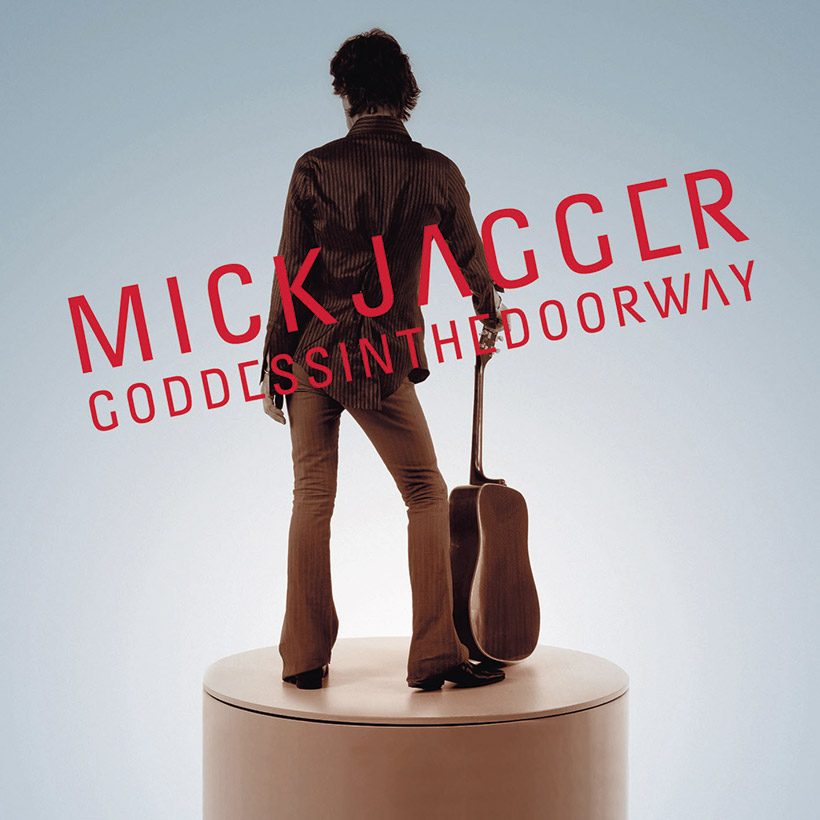‘Goddess In The Doorway’: Mick Jagger’s Muse Aided His Best Solo Album
The album was hailed as his finest solo work, and as good as any Rolling Stones album since ‘Some Girls.‘

Rolling Stone could hardly have been more approving of a Rolling Stone. “In terms of consistency, craftsmanship, and musical experimentation,” they wrote of Mick Jagger’s fourth solo album, “Goddess In The Doorway surpasses all his solo work and any Rolling Stones album since Some Girls.”
If that review gave the record a mountain of commercial expectation that it could never quite scale, there was a widespread feeling among both critics and fans that Goddess In The Doorway, released on November 19, 2001, was Jagger’s best solo work to date. Given the weight of his lifetime achievements in a career that was already approaching the 40-year mark, that seemed to have come as a surprise to some, including Uncut magazine, who concluded that “Goddess In The Doorway is really rather good.”
This is me, on my own
The album began to formulate after the Stones’ exhausting Bridges To Babylon tour of 1997-98. “When we finally came off the road,” Jagger said in a Billboard interview, “I wanted to write some songs and do them on my own. I started recording at home in France and in the Caribbean with a hard-drive computer. I worked the songs up in demo studios. It became my home recording. I thought, This is me. It’s a solo record.”
Jagger worked closely with confidant, co-writer and instrumentalist Matt Clifford, who co-produced the album with American pop, rock and country mainstay Marti Frederiksen. By the time the sessions for Goddess In The Doorway finished, later in 2001, an impressive array of names were on board.
Career-long friend Pete Townshend, for example, was a prime force in encouraging Mick to make the record at all, which came out a few months ahead of the extensive commitments he would have to the Stones’ 40th-anniversary celebrations of the Forty Licks compilation and Licks tour.
Townshend went on to play guitar on two tracks, “Joy” and “Gun,” the former also featuring prominent vocals by another pal, Bono. “Joy,” indeed, could almost have been a U2 experiment, with its wide sonic parameters and gospel undertones. Lenny Kravitz was both co-writer and co-producer with Jagger on the exhilarating single “God Gave Me Everything,” which became a rock radio hit in America and also had Kravitz playing electric and bass guitar, among other instruments.
Collaborators from Joe Perry to Wyclef Jean
Fellow US rocker Joe Perry made his mark on “Everybody Getting High” and “Too Far Gone,” while Rob Thomas of Matchbox Twenty co-wrote the second single, “Visions Of Paradise,” with Jagger and Clifford. Thomas was still basking in the boundless success of “Smooth,” his co-write for Carlos Santana’s career-redefining Supernatural album.
Then there was the American R&B flavor that has always been a feature of Jagger’s writing, and which often comes to the surface even more prominently on his solo work. The genre-crossing, beat-filled “Hide Away” had him co-producing with Wyclef Jean and fellow former Fugees member – and fellow Haitian – Jerry “Wonder” Duplessis.
The song was widely hailed as one of the album’s highlights, with NME saying that it and “Lucky Day” “are as good as anything on prime-time Stones album Black And Blue, which is saying something.” The impressively atmospheric “Lucky Day” also featured Jagger’s ever-nimble harmonica work.
Any way he wanted
The extensive cast list for the album also included British soul presence Ruby Turner on backing vocals, folk artist Steve Knightley, of Show Of Hands, on cello, and erstwhile Dire Straits touring member Chris White on tenor saxophone. Jagger’s daughters Elizabeth and Georgia May (at the time, aged 16 and eight, respectively) both contributed backing vocals to the reflective “Brand New Set Of Rules.” That was produced, as was “Lucky Day,” by Chris Potter, best known for his work with The Verve. Their own indelible Stones connection had arrived in 1997 on “Bitter Sweet Symphony,” with its famous sample of Andrew Loog Oldham’s orchestral version of “The Last Time.”
Listen to the best of Mick Jagger on Apple Music and Spotify.
Goddess In The Doorway sold well over 300,000 copies in the US in its first two years, also winning gold certification in Germany and Spain. Soon, Jagger would be once again sharing his licks with the Stones, but he had made one of the most important statements of his solo career.
“The good thing about being in a band is there’s a committee,” he told Billboard. “But that’s the bad thing about it as well. You try to please everyone…with this record, I could go any way I wanted.”
Buy Mick Jagger’s four solo albums on 180 gram vinyl.












